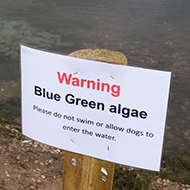UK dog walkers warned of fatal blue-green algae

Algal blooms have been spotted across the UK.
Pet owners across the UK are being warned to take extra care when walking their dogs near bodies of water this summer.
The British Veterinary Association (BVA) issued the official warning after a dog died earlier this month after coming into contact with blue-green algae at Loch Awe in the Scottish Highlands. Algal blooms have been spotted across the UK, including areas such as the Central Belt of Scotland, Derbyshire, the Midlands, Essex, Pembrokeshire and the Brecon Beacons.
Cyanobacteria – commonly known as blue-green algae – are a group of bacteria containing harmful toxins. It may resemble green or greenish-brown scum on the water surface, such as on a river, pond or lake. If a dog drinks from the affected water, or licks their fur after swimming in it, they may ingest the bacteria.
Symptoms, which may appear within minutes to hours after exposure, may include:
- vomiting
- diarrhoea
- drooling
- disorientation
- trouble breathing
- seizures
- blood in the faeces.
Unless treated, symptoms may lead to liver damage and death.
The BVA has advised pet owners with the following advice:
- check for any official warning notices near bodies of water by local authorities or the national environment agency
- ensure your dog remains on a lead and next to you if you are near any water bodies suspected to be contaminated. Do not allow drinking or swimming from the water
- thoroughly wash your dog’s coat with plenty of clean water if they have been swimming outside
- if you are concerned that your dog may have been exposed to blue-green algae, seek veterinary treatment immediately
- if you spot blue-green algae, take a photograph and report sightings to the UK Centre for Ecology & Hydrology’s (UKCEH) Bloomin’ Algae app.
BVA senior vice president Daniella Dos Santos commented: “It’s been a warm start to the summer and we have started hearing of increasing numbers of blue-green algae sightings across the UK. While a paddle in a cool lake may be your dog’s favourite outdoor activity at this time of the year, we’d urge pet owners to keep them on a lead during walks near water bodies confirmed to have algal blooms. The majority of blooms are toxic and it is impossible to tell the difference visually, so it is better to be safe than sorry.
“There is currently no known antidote for the toxins, so prompt veterinary treatment is the only way to tackle their effects and ensure a good chance of recovery for your pet. If you suspect your dog has been exposed to blue-green algae, please seek emergency veterinary treatment as soon as possible."
Professor Laurence Carvalho of the UK Centre for Ecology & Hydrology commented: “The public can play a crucial role in providing a rapid, early warning to pet owners about outbreaks of blue-green algae.
“If people report sightings via the Bloomin’ Algae app with a photograph, we can quickly check if it is blue-green algae or something harmless, with correct and incorrect reports plotted on an interactive map in the app.
“App users can also set up notifications for confirmed blooms in their area.”



 The RCVS has announced a new version of its 1CPD mobile app, with enhanced features for veterinary surgeons and veterinary nurses to record their continuing professional development.
The RCVS has announced a new version of its 1CPD mobile app, with enhanced features for veterinary surgeons and veterinary nurses to record their continuing professional development.